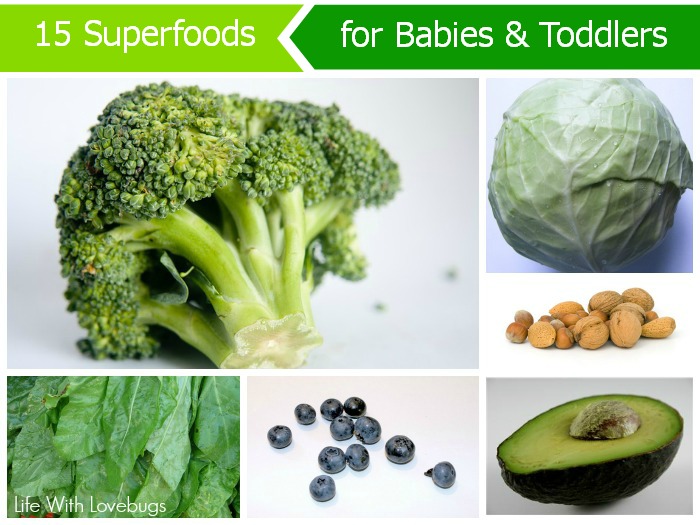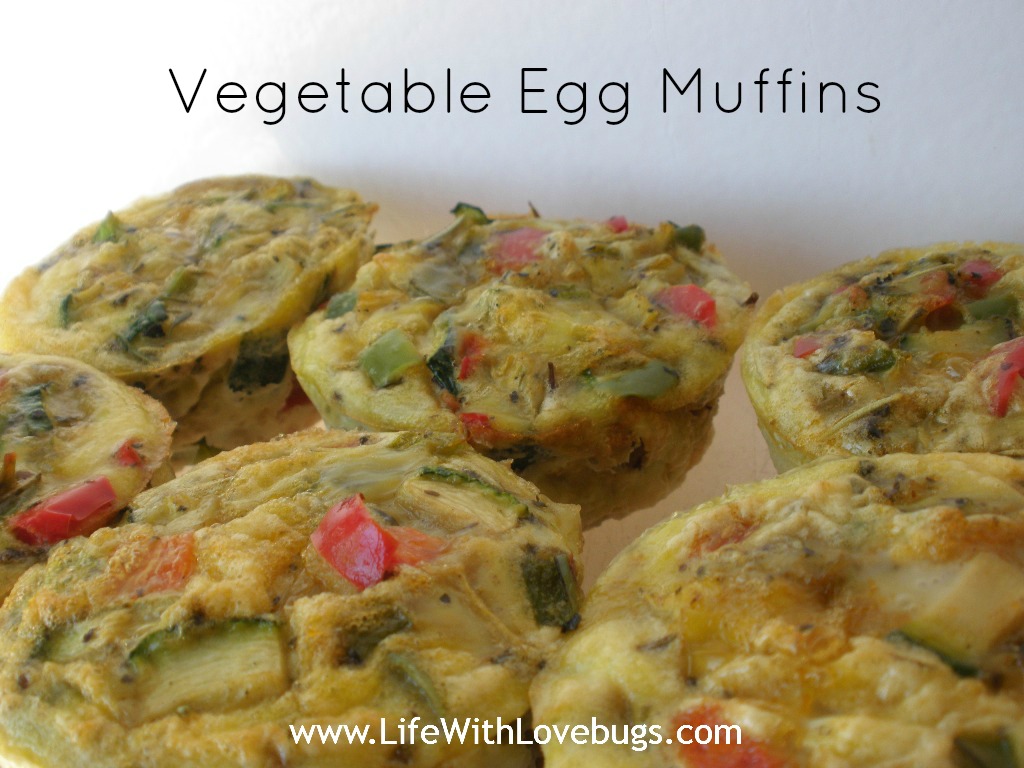15 Superfoods for Babies & Toddlers

Making healthy meals takes some planning. But that can be difficult for working parents struggling to get home in time to pick their kids up from their latest extracurricular activity, or trying to feed a child that only wants processed foods like macaroni and cheese or pizza at every meal. Do not fret. Small changes in daily routine, nutritional understanding and fitness awareness can make huge differences in your family’s overall health. Incorporating healthy and nutritious foods into your family’s bellies can be done, but it may take a little work.
We all have heard the harsh statistics about the growing obesity and diabetes rates in the developed countries, especially in America. Our children will live a two- to five-years’ shorter life span than us . . . if healthy eating and physical habits are not adopted at an early age. Eat fresh, live, organic and green foods with your child/ren to show them how to be healthy. They will mirror your behavior and feel positive about food. Have your child/ren help select their favorite fresh produce at the grocery store or farmers market, and prepare meals with you in the kitchen. Even washing the vegetables before cutting them up will allow them to be a part of the cooking process. Children love to taste foods they helped select and make. It might encourage them to try a new food!
As a parent, you want to provide foods that nourish your child while promoting brain and body development. Super foods contain antioxidants, vitamins, minerals, fiber, healthy amounts of fats, carbs and proteins. Since such foods are nutrient-dense, even small servings pack a big punch, and with their minds and bodies growing at amazing exponential rates, they need the most nutritionally dense foods to help them develop optimally!
Below are the top SUPERFOODS for babies and toddlers:
1: Broccoli
This superfood is loaded with fiber, calcium, and plenty of vitamins and minerals, which helps child’s eyesight and ward off cell damage. Eating it raw is the best way to ensure that your child gets all those nutrients, but that may be a tough sell to the little ones. Steam them for about five to eight minutes and drizzle parmesan cheese and olive oil or a little butter over the top. Let them dip them into salad dressing for fun.
2: Greek-Style Yogurt
Yogurt contains healthy live probiotic bacteria, which boosts your child’s immunity and aids in digestion. Greek-style yogurt has two to three times more protein than regular yogurt–it also contains less sugar. To sweeten, add fruit, maple syrup or agave. Add a little honey if your child is older than 1.
3: Cocoa Powder
Cocoa powder contains high concentrations of flavonoids, which improve blood pressure, as well as heart and oral health. Flavonoids also may protect your child’s skin from sun damage. Look for at least 70 percent pure cocoa–avoid products processed with alkali, which removes most of the flavonoids. Sprinkle cocoa on pancakes, waffles or French toast. Mix a little cocoa with milk to create a chocolate drink.
4: Black Beans, Lentils or Garbonzo Beans
Beans are full of protein, fiber and calcium. They also help guard against heart disease and high cholesterol. Add black beans to quesadillas or salsa and lentils to soup. Mash the beans with salsa or olive oil to create a black bean dip for crackers or chips.
5: Blueberries
Blueberries are packed with brain boosting antioxidants. This small fruit may improve brain function and protect against heart disease. Because of their size, blueberries are a natural finger food, and children may enjoy eating them plain. Use blueberries in oatmeal or cereal as well. Mix the fruit with yogurt and granola or put blueberries and yogurt in a blender to make a healthy smoothie.
6: Whole Grains
Whole grains can be found in bread, cereal and crackers — all foods kids usually enjoy. They’re rich in folic acid, iron, zinc and B vitamins and some are fortified with vitamin D and calcium as well. Start your kids on whole grains, especially sprouted breads and pastas early, to give them a head start against heart disease. Avoid the pre-packaged products that contain unsaturated fats, better known as trans-fats. Read the nutritional information on the labels carefully.
7: Avocados
Avocados are the only fruit laced with monounsaturated “good” fats that may lower “bad” LDL cholesterol, which can harm the heart. The avocado is also a super source of soluble fiber, which helps stabilize blood sugar. And it’s full of vitamin E, which protects your cells from free radicals. Mash avocado with a little lime or lemon juice and yogurt and using it on quesadillas or tacos — or as a dip for raw vegetables.
8: Wild Salmon
This cold-water fish contains healthful fats known as omega-3s that can lower the risk of heart disease. These nutrients may also help improve mood and prevent memory loss. Choose wild salmon to reduce your child’s exposure to toxic substances such as PCBs and mercury. Lightly crumb thin strips of salmon and bake them for healthy fish sticks.
9: Cage Free Eggs
Eggs are a clean protein. The protein in eggs is so beneficial that all other foods use it as the gold standard. Aside from protein, eggs are full of more than a dozen necessary vitamins and minerals, and contain a huge concentration of choline — a nutrient vital for brain development in young children. To boot, eggs are one of the most versatile foods on the planet. You can cook eggs many ways, but chances are your child has a favorite, whether it’s scrambled or fried.
10: Walnuts
Walnuts make a great protein snack, and you can add them easily to your child’s lunchbox. They contain omega-3 fatty acids, which help brain function, fend off disease and lift depression. Chop up walnuts and add them to salad, baked goods or cereal.
11: Cabbage
Slice up some cabbage with carrots and broccoli bits and add a simple citrus vinaigrette dressing to make a healthy coleslaw or boil them in some vegetable broth for a hearty soup. Cabbage is a cruciferous vegetable, packed with phytonutrients to help with digestion and keep illness at bay. Kids will appreciate the crunch and relatively mild taste that can be mixed into many dishes.
12: Kale, Asparagus, Chard, and other dark leafy greens
These leafy greens boast high amounts of iron and folate and are rich in antioxidants like lutein and zeazanthin protect the eye and aide in its development. These amazing leaves are top super foods because they contain a large amount of vitamin C and good amounts of calcium and vitamin K. Together the calcium and vitamin K are superb bone builders (studies show that vitamin K is needed to activate bone proteins) to help give your baby a strong skeleton.
13. Spinach
An excellent source of iron, calcium, and folic acid, along with vitamins A and C, spinach is great for growing bones and brains.
This versatile vegetable has a mild flavor and cooks in a flash. It can be stirred into hot soups, toss it into tomato sauce or an omelet, and hidden into quesadillas.
14: Sweet Potatoes
Sweet potatoes provide a great source of potassium, vitamin C, fiber, folate, vitamin A, calcium and iron. Treat sweet potatoes just like you would any other potato. They can be mashed, grilled, roasted or made into a delicious sweet casserole. The best bet to get your kids to eat them may be to make oven-baked sweet potato French fries with a drizzle of coconut oil, cinnamon, and agave on top.
15. Quinoa
This gluten free grain is a protein rich seed that has a fluffy, creamy, slightly crunchy texture and a somewhat nutty flavor when cooked. In addition to being a complete protein (contains all 8 essential amino acids), quinoa is has a good amount of fiber and is high in nutrients such as manganese, magnesium and iron. Quinoa is also an amazing alternative to whole grain rice in many baby food recipes.
Dr. Nancy Lin DeGreogori, Ph.D



